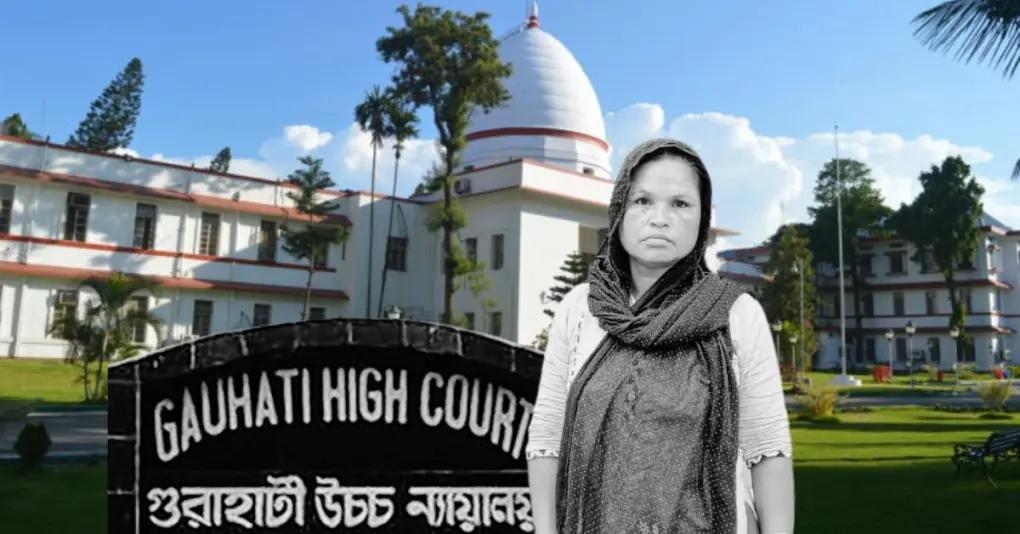At the hearing on October 15, 2025, in the petition filed by Abdul Rejjak concerning the disappearance and alleged deportation of his wife, Doyjan Bibi, the Gauhati High Court directed the State to file a detailed affidavit clarifying the circumstances under which she was reportedly “pushed back” to Bangladesh. The Court noted that the petitioner’s grievance — that Doyjan Bibi was taken from lawful custody and sent across the border without any documented handover or receipt — raised serious procedural and legal questions.
Appearing for the petitioner, Advocate Mrinmoy Dutta reiterated that Doyjan Bibi had been picked up by police and subsequently declared as “deported” without any formal record of transfer, handover certificate, or receipt from Bangladeshi authorities. He reminded the Bench that throughout the proceedings, no evidence had been produced to show compliance with the established protocol of “handing over and taking over” mandated in cross-border transfer cases. “The wife had been picked up. Then it was informed that she had been deported. We have not been given any letter of handing over or any details,” he submitted.
The Bench, taking note of these submissions, asked whether notice had been issued earlier in the case, to which counsel confirmed that it had. The Court observed that the State’s current position — that Doyjan Bibi had been deported back to Bangladesh — was being challenged on the ground of lack of due process. The Bench therefore directed the FT counsel to obtain instructions from the authorities and to file a detailed affidavit addressing the allegations.
The order records:
“In view of the nature of the grievance raised in this petition, the respondents will file an affidavit two days prior to the next date of listing.”
The matter has been listed for further hearing on October 29, 2025. CJP has been providing legal aid in the said case.
Background of the case
The petition concerns the disappearance of Doyjan Bibi, wife of petitioner Abdul Rejjak, who was allegedly picked up by police on May 25, 2025, without any formal documentation, and subsequently reported as “handed over to the BSF” for deportation to Bangladesh.
In the June 25 hearing, the State had produced written instructions from the Frontier Headquarters, BSF Guwahati, claiming that Doyjan Bibi — identified as the wife of Abdul Munnaf — had been handed over to Bangladeshi authorities on May 27, 2025. However, the petitioner had clarified that his wife’s name and all case particulars matched, and that she was indeed “Doyjan Bibi, wife of Abdul Rejjak,” not “Abdul Munnaf.” The Court had then directed the FT counsel to obtain clarification regarding the manner of her handover.
In the July 25 hearing, when a further set of documents was produced, the petitioner’s counsel raised strong objections, pointing out that no handover certificate, no Bangladeshi acknowledgment, and no procedural record of deportation had been placed on record. The Bench observed that if the State’s position was that Doyjan Bibi had been pushed back, the petitioner could challenge the legality of that act. “Human beings cannot just disappear like that,” Advocate Dutta had argued, stressing that pushback procedures are meant for persons intercepted at the border — not those already in custody.
The present direction, therefore, stems from the continuing absence of any formal proof or procedural compliance in the alleged deportation of a woman who had been under police custody, not caught at the border.
The High Court’s October 15 order marks a crucial development as the Court has now required the State to formally defend its actions through affidavit.
Details of previous hearings may be read here.
Related:
Bangladeshi Court declares deported Bengal families as Indians, orders their return
Assam BJP’s AI video a manufactured dystopia, Congress files complaint, myths exposed
CJP scores big win! Citizenship restored to Mazirun Bewa, a widowed daily wage worker from Assam
Victory in Dhubri FT: Jarina Bibi declared Indian after years of ordeal
Assam’s New SOP Hands Citizenship Decisions to Bureaucrats: Executive overreach or legal necessity?
